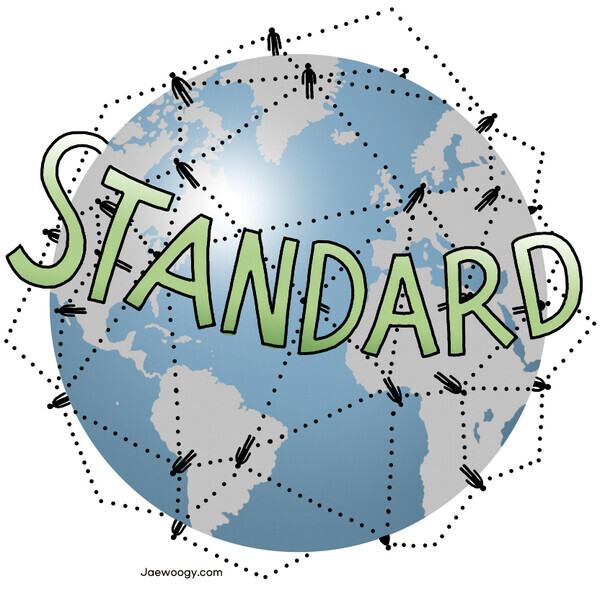hankyoreh
Links to other country sites 다른 나라 사이트 링크
[Column] Yoon’s labor plans shirk the “global standards” Korea so clings to

It was around the time of the Asian financial crisis of the late 1990s that the phrase “global standard” really started making the rounds in South Korea.
“Openness” had already emerged as a zeitgeist with the globalization policy efforts of the previous president, Kim Young-sam, and the 1995 launch of the World Trade Organization (WTO). The “global standard” here was a benchmark of openness.
The events that followed the crisis that erupted in 1997 remain a painful memory. The managing director of the International Monetary Fund (IMF) at the time, Michel Camdessus, visited South Korea and received “blank check” promises from the candidates in the 15th presidential election — including Kim Dae-jung from the National Congress for New Politics and Lee Hoe-chang from the Grand National Party — that they would accept the IMF’s demands in exchange for bailout assistance.
At a time when businesses were borrowing excessively, the IMF’s conditions included the liquidation of companies with a debt ratio over 200%. Many South Korean businesses went bankrupt.
The global standard would later turn into an irrefutable golden rule for both the left and right. After his stern response to a Korean Railway Workers’ Union strike, then-President Roh Moo-hyun announced plans in July 2003 to “reorganize institutions to meet a global standard, regardless of whether that benefits the workers or the employers.”
Observers have consistently sounded the warning that the “global standard” term is merely packaging for transnational business interests. “Minerva,” a blogger who became well-known during the Lee Myung-bak administration for trenchant economic analyses on the Daum Agora site, spoke of a system in which South Korean businesses were carelessly sold off to overseas investors.
“This ends up getting dressed up in Korea as a ‘global standard,’ and it is what has allowed the US Commerce Department and Wall Street to earn 10 years’ worth of profits in Korea in a single year, or allowed people to speak openly about the Asian financial crisis as a ‘once-in-a-lifetime portfolio investment opportunity,’” they wrote.
Labor policies and the global standard have also consistently followed on each other’s heels. When the South Korean government introduced the “time off” system barring payment of wages to full-time unionists in 2009, its rationale was that it was aligning with the global standard. When the Moon Jae-in administration ratified core International Labour Organization conventions, the global standard was once again the main rationale.
After the Yoon Suk-yeol administration announced its plan for revising working hour restrictions, it trotted out the “global standard” to rebut arguments about the dangers of concentrated working hours and the backsliding in working hour reductions.
According to Organisation for Economic Co-operation and Development figures from 2021, South Korea’s annual working hours averaged 1,915. The administration made no mention of how it intends to bring that figure in line with those of countries like Germany (1,349 hours), France (1,490), or Sweden (1,444).
By Jeon Jong-hwi, social policy team staff reporter
Please direct questions or comments to [english@hani.co.kr]

Editorial・opinion
![[Column] Season 2 of special prosecutor probe may be coming to Korea soon [Column] Season 2 of special prosecutor probe may be coming to Korea soon](https://flexible.img.hani.co.kr/flexible/normal/500/300/imgdb/original/2024/0426/3317141030699447.jpg) [Column] Season 2 of special prosecutor probe may be coming to Korea soon
[Column] Season 2 of special prosecutor probe may be coming to Korea soon![[Column] Park Geun-hye déjà vu in Yoon Suk-yeol [Column] Park Geun-hye déjà vu in Yoon Suk-yeol](https://flexible.img.hani.co.kr/flexible/normal/500/300/imgdb/original/2024/0424/651713945113788.jpg) [Column] Park Geun-hye déjà vu in Yoon Suk-yeol
[Column] Park Geun-hye déjà vu in Yoon Suk-yeol- [Editorial] New weight of N. Korea’s nuclear threats makes dialogue all the more urgent
- [Guest essay] The real reason Korea’s new right wants to dub Rhee a founding father
- [Column] ‘Choson’: Is it time we start referring to N. Korea in its own terms?
- [Editorial] Japan’s rewriting of history with Korea has gone too far
- [Column] The president’s questionable capacity for dialogue
- [Column] Are chaebol firms just pizza pies for families to divvy up as they please?
- [Column] Has Korea, too, crossed the Rubicon on China?
- [Correspondent’s column] In Japan’s alliance with US, echoes of its past alliances with UK
Most viewed articles
- 1Samsung subcontractor worker commits suicide from work stress
- 2Division commander ordered troops to enter raging flood waters before Marine died, survivor says
- 3No good, very bad game for Korea puts it out of Olympics for first time since 1988
- 4‘We must say no’: Seoul defense chief on Korean, USFK involvement in hypothetical Taiwan crisis
- 5[Column] Season 2 of special prosecutor probe may be coming to Korea soon
- 6Is N. Korea threatening to test nukes in response to possible new US-led sanctions body?
- 7Korea’s 1.3% growth in Q1 signals ‘textbook’ return to growth, says government
- 8US overtakes China as Korea’s top export market, prompting trade sanction jitters
- 9[Column] Has Korea, too, crossed the Rubicon on China?
- 10[Column] ‘Choson’: Is it time we start referring to N. Korea in its own terms?